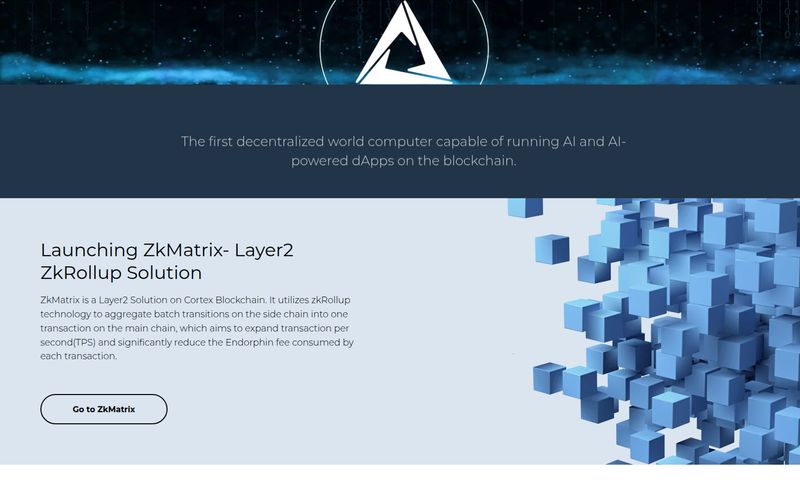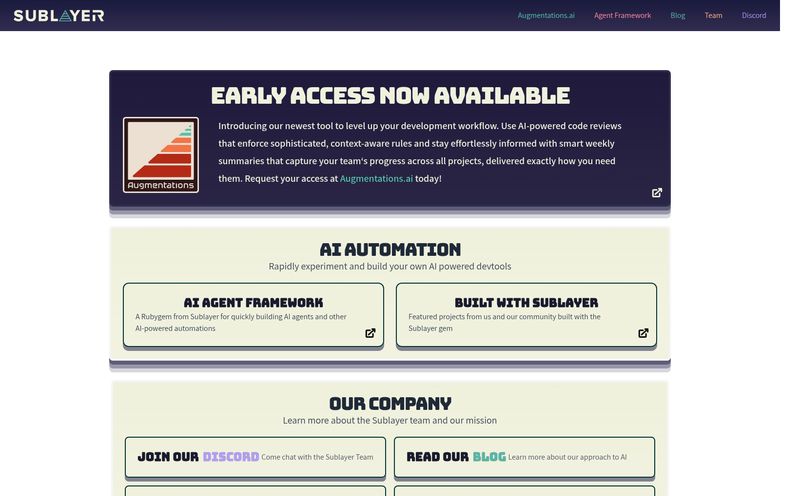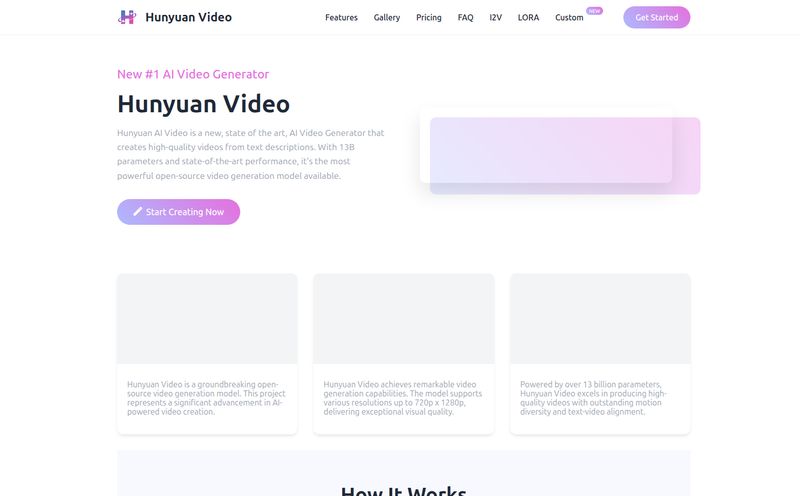We've all been there. You've got this brilliant, world-changing idea percolating in your brain. It's a side project, a passion piece, something that could genuinely help the community. But then reality hits you like a ton of bricks, or in the case of AI, a massive GPU bill. Building cool stuff, especially in Artificial Intelligence, costs money. A lot of it. Compute time isn't cheap, and living on ramen noodles while you code gets old, fast.
So when I stumbled upon AI Grant, I was intrigued. The promise is simple, almost deceptively so: grants for open source projects. No equity, no complex terms, just a boost to get your idea off the ground. But is it too good to be true? As someone who's seen a million 'game-changing' platforms come and go, my skepticism meter was twitching. So, I did a little digging.

Visit AI Grant
What Exactly is AI Grant Anyway?
At its core, AI Grant is a philanthropic initiative founded back in 2017 by some pretty heavy hitters in the tech world: Nat Friedman (you might know him as the former CEO of GitHub) and Daniel Gross (an investor and former partner at Y Combinator). Their involvement alone gives this a serious dose of credibility. These guys aren't just casual observers; they've been in the trenches of software development and startup culture.
The program offers grants ranging from $5,000 to $50,000 for promising open-source AI projects. And here's the part that really caught my eye: the grants come with no strings attached. Let that sink in. They can give you cash directly or, maybe even more valuable for many, access to compute resources. It's less like a bank loan and more like a patronage from a modern-day Medici, but for code.
The Magic of 'No Strings Attached'
This isn't venture capital. They aren't asking for a percentage of your non-existent company. They aren't putting a board member in your business. It's a genuine grant. You get the funds to build your thing, and your only obligation is to, well, build it and keep it open source. This is a massive departure from the typical funding models that can often pull a project away from its original community-focused vision. It's a breath of fresh air, honestly.
A Glimpse into the AI Grant Portfolio
Okay, so the philosophy is great. But what kind of projects are actually getting this money? Are we talking about PhD-level research that's impossible to understand, or tools that people in the community can actually use? The answer, it seems, is a bit of both, and that’s what makes it so interesting.
A quick look at their recent grants shows support for foundational projects that many of us are probably using right now. They've funded work on llama-cpp-python, which made it way easier for people to run large language models on their own computers. They also supported the development of the GGUF file format, a critical piece of infrastructure for the local AI movement. These aren't flashy, headline-grabbing apps; they're the vital nuts and bolts that the entire open-source AI ecosystem depends on.
But it's not all just infrastructure. The list of prior grants is a wild ride through the creative and sometimes quirky potential of AI. I saw everything from:
- Tools for generating puns (because why not?)
- AI for analyzing drug docking and modeling gravitational lensing
- Projects to detect child abuse in X-Rays and interpret brain stroke scans
- An AI that protects your photos from face recognition
- Even a project for generating video game art
This diversity is what sold me. It shows they're not just backing one specific flavor of AI, but fostering a whole garden of different ideas, from the profoundly serious to the wonderfully creative.
The Good, The Bad, and The Realistic
No platform is perfect, and it's important to look at this with a clear head. Let's break it down.
The Obvious Upside
The primary benefit is, of course, the funding. Getting a $10,000 cash or compute grant can be the difference between a project living and dying. But I think the value goes beyond the money. Getting a nod from people like Nat Friedman and Daniel Gross is a huge signal boost. It's a stamp of approval that can attract other contributors and bring a lot of positive attention to your work. Plus, their commitment to open source strengthens the entire community, creating better tools for everyone.
A Dose of Realism
Now for the reality check. First, these grants are not enormous sums of money in the grand scheme of AI development. While $50,000 is a fantastic boost, it won't fund a large team for a year. It's seed-level funding designed to catalyze, not sustain. Second, you have to assume the application process is incredibly competitive. With the founders' reputations and the 'no-strings' offer, they're likely flooded with applications. You'll need a stellar idea and a clear plan. Lastly, the focus is squarely on open source. If you have a closed-source, commercial product idea, this isn't the place for you.
| Aspect | The Lowdown |
|---|---|
| Funding Amount | $5,000 - $50,000 (Cash or Compute) |
| Equity Taken | Zero. None. Zilch. |
| Focus | Strictly Open Source AI Projects |
| Ideal Applicant | Indie devs, researchers, or small teams with a cool open-source idea. |
What About the AI Grant Accelerator?
This is where things get a little fuzzy. On the grant page, there's a link that says "Looking for our accelerator program? Check out aigrant.com!" When I clicked on it, I hit a `404 NOT_FOUND` error. This could be a temporary glitch, or maybe they're rethinking the accelerator part of their operations. It's a good reminder that even in the world of high-profile tech initiatives, things can be a bit messy. For now, the grant program seems to be the main, active offering. It's distinct from a traditional accelerator, which typically involves mentorship, a cohort, and a larger equity stake in exchange for funding.
So, Should You Apply?
In my opinion, absolutely. If you're an individual or a small team with a genuine, innovative open-source AI project that just needs a little fuel to get going, this is one of the best opportunities out there. Don't think of it as a way to get rich. Think of it as a community-backed initiative to build the future of AI in the open.
The worst thing that can happen is they say no. The best thing? You get the resources and the recognition to turn your passion project into something that could have a real impact. Its a no-brainer, really.
Frequently Asked Questions
- How much funding does AI Grant provide?
- They offer grants between $5,000 and $50,000. This can be provided as cash or in the form of compute credits, which can be extremely valuable for training and running AI models.
- Is the AI Grant funding equity-free?
- Yes, completely. This is one of its biggest selling points. The grants are provided with "no strings attached," meaning they do not take any ownership or equity in your project.
- What kind of projects does AI Grant support?
- They support a very wide range of open-source AI projects. This includes everything from core infrastructure and developer tools (like model formats and libraries) to novel applications in science, art, and accessibility.
- Who founded AI Grant?
- AI Grant was established in 2017 by Nat Friedman, the former CEO of GitHub, and Daniel Gross, an investor and former Y Combinator partner. Their experience adds significant weight and credibility to the program.
- Is AI Grant the same as the AI Grant accelerator?
- They appear to be separate things. The grant program is for direct, no-strings-attached funding. There is a link to an accelerator program, but it appears to be inactive or under construction as of late 2023. The grant program is the primary, confirmed offering.
- Where can I apply for an AI Grant?
- You can find information and likely the application process on their official grants page, which is separate from their commercial accelerator domain. A quick search for "AI Grant open source" should get you there.
Final Thoughts
In a field that's becoming increasingly dominated by a few massive, closed-off corporations, initiatives like AI Grant are more important than ever. They are a critical part of the ecosystem, providing the seed corn for the next generation of open-source innovation. It's not just about the money; it's about a philosophy that believes in the power of community and building in the open.
So if you're out there tinkering on an AI project in your spare time, feeling like you're shouting into the void, take a look at AI Grant. It might just be the partner you need to be heard.
Reference and Sources
- AI Grant Homepage: The primary source for grant information (Note: a direct URL was not provided, but is easily searchable).
- Nat Friedman: Further information can be found on his Twitter/X profile or personal website.
- Daniel Gross: Further information can be found on his Twitter/X profile or personal website.



